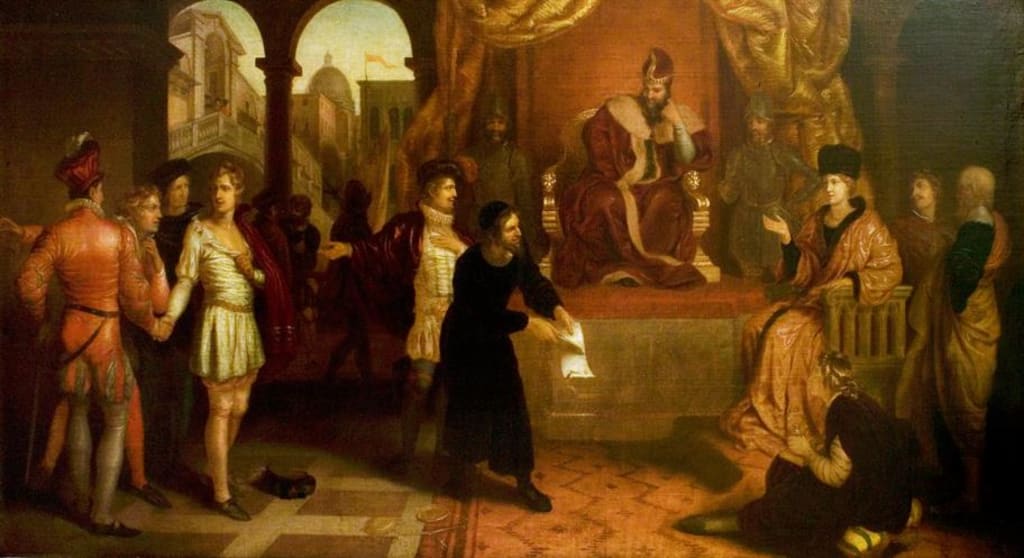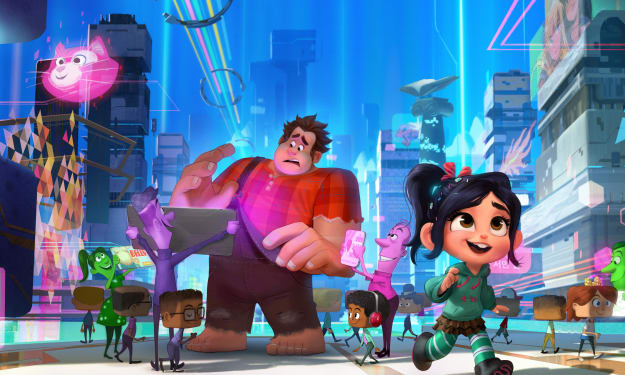Homosexual Themes in 'The Merchant of Venice'
William Shakespeare made many well known popular plays throughout his life which are still relevant because of their themes and characters.

William Shakespeare made many well known popular plays throughout his life which are still relevant because of their themes and characters. Shakespeare’s play, The Merchant of Venice, has given rise to many disputes about whether one of its main characters, Antonio, is possibly gay. Antonio is a Venetian merchant who spends most of his time throughout the play glued to Bassanio because of a bond. But this isn’t all about Antonio. Portia’s sexuality is a question as well. She has sent many suitors away because she doesn’t want to marry them. Is this because she is not yet ready to marry or for other reasons that she is trying to keep secret? Does Shakespeare do this on purpose to play with readers minds?
Antonio is a Venetian merchant who is trying to help Bassanio pay off a debt to marry Portia throughout the play. Antonio starts off the play by telling the audience that he is sad and questions if he even knows himself. Nothing can make him happy, not even the merchandise he owns. Shakespeare’s time period was hard for a homosexual person because it was not socially acceptable to be gay or lesbian at this time. As Antonio pities himself further, he calls life, ‘“A stage where every man must play a part/ and mine a sad one.’” [Line 82-83, Act 1, Scene 1]. He is clearly a very rich man, but his resources are tied up at the time Bassanio needs this money. Antonio is not willing to admit this to Bassanio. He doesn’t want to make Bassanio worried and therefore does everything to try and get him the loan, even going as far as trying to get money from his friends. It is most evident when he tells Bassanio, ‘“My purse, my person, my extremed means/ Lie all unlocked to your occasion.’” [Line 145-146, Act 1, Scene 1].
By the 1950s people started interpreting Antonio as a homosexual character. Shakespeare was known for his poetic style of writing, therefore making his style of talking sound more poetic. The text never specifies how old Antonio is, but he is said to be older than Bassanio. A man of his age and of so much wealth would ordinarily be married. In the 1950s, the language was much more expressive, so people in the modern day society took Antonio to be homosexual. Modern productions of Merchants of Venice use the theory that Antonio is suffering from his love for Bassanio to explain his melancholic behavior, but it is not proven. This is a big theory, and going back to how times were in Shakespeare’s world, it was very hard for a man or women to express their feelings. It was considered a sin. Antonio is depressed that he’ll never be able to tell Bassanio or anyone how he really feels.
Although Bassanio is trying to woo Portia, the text has implications that he and Antonio may be a couple. This is most obvious when Bassanio is set to sail out on a trip. Salarino witnesses the goodbye and describes, “I saw Bassanio and Antonio part./ Bassanio told him he would make some speed/ of his return.../ and even there, his eye being big with tears/ turning his face, he put his hand behind him,/ and with affection wondrous sensible/ he wrung Bassanio’s hand-and so they parted.” [lines 39-51, Act 2, Scene 9] The line "with affection, wondrous sensible" has two meanings. Shakespeare used this vague language intended to create doubt. In the first meaning, sensible can be alluding to the physical sensation of touch by a potential lover that in this unrequited affair feels wondrous to Antonio. In the second reading, sensible can be defined as they’re aware of their surroundings and have to be cautious in public in order to hide any homosexuality.
That whole line felt as if the two men were together and trying to hide that they have romantic feelings for one another. As they are talking, both Solanio and Salarino are suspicious of their interactions. During Shakespeare's time, people were looked down upon if they announced a difference in their sexuality. Bassanio is even offended when he misinterprets what Shylock asks him. Shylock asks if Antonio is good, as in for money, which Bassanio gets defensive about. These two men are always there for the others' needs, even when Bassanio runs out on his marriage to rescue Antonio. This is something that true friends would do for the other, but their relationship clearly causes suspicion among the other characters.
There have also been a few movie versions made of Merchants of Venice which have specified this topic more. The 2004 version of Merchants of Venice is well known for this theme because the two actors who portray Antonio and Bassanio end up sharing a kiss at one moment. Actor Joseph Fiennes who played Bassanio says, “[Shakespeare’s] not saying if they’re gay or they’re straight, he’s leaving it up to the actors… If you look at the choice of language, you’ll read very sensuous language… The great thing about Shakespeare and why he’s so difficult to pin down is his ambiguity.” This is very interesting because not much is known about William Shakespeare’s life. The question has been brought up if he was a homosexual or not and some surviving evidence of his life suggest that he didn’t have a strong relationship with his wife, Anne Hathaway. This was a repressive time period where men and women could not state their sexuality.
Portia is also another character who has raised similar questions. She is an heiress who has to be married but has sent away every suitor. Portia is not impressed by any of the men who have come to see her and mocks each and every one of them for little reasons. She even makes up pointless games for her suitors to play who end of failing. It is clear that she doesn’t want to marry. Portia would rather, ‘“...be married to a death’s head with a bone in his mouth.’” [Line 50-51, Act 2, Scene 1]. Portia always confides in her lady in waiting, Natessa. It is obvious that Natessa knows why Portia doesn’t want to marry but has to keep it a secret on her behalf. During the second half of the play, Portia and Natessa cross-dress in order to spy on Bassanio and all the other men. Portia has had the plan to dress up like a boy from the beginning. There is an interesting conversation that takes place with Natessa and Portia when Natessa asks, “Why shall we turn to men?” while Portia’s response is; “Fie what a question that.” [Lines 82-84] Maybe she actually wants to be a boy, because she’d rather be with a woman. But, in the final act is it revealed that Portia, cross-dressed as the lawyer is the one who gave Antonio the money he needed. This is a very interesting note because women of this time could not live independently. She wants to be her own person instead of having to marry a man who will take care of her.
Bassanio is the last to ask Portia for her hand in marriage, and surprisingly she accepts. During the final climax of the play, many fights ensue and right before Portia is going to walk out, Antonio pleads with her to stay and marry Bassanio. Again he is doing this for Bassanio because he doesn’t want to see the man so sad. Portia and Antonio have these same feelings in common. They are sad but want others to see them as happy. Portia comments about her, “‘worthless self’” [Line 17, Act 2 Scene 8], while Antonio questions himself and is not happy. As stated by Portia, ‘“Let me give light, but let me not be light,/ For a light wife doth make a heavy husband,’” [Act 5, Scene 1. Lines 140-141]. Portia doesn’t want to cheat herself into something that is not true. She wants to give light, and be true to herself and not be light, or betray herself. This also goes for Antonio.
Shakespeare’s ambiguous language can also be interpreted as the light, cheating, unfaithful wife which leads to an unhappy and emotionally burdened husband. Portia and Antonio cannot spread their inner light because they are forced to keep their secrets hidden. In Shakespeare’s time, light meant to show the way, so for Antonio and Portia to reveal their true colors. It is obvious that he is happy whenever Bassanio comes along, but he may just be putting up an act to make him believe that he is okay. Bassanio notices how strange Antonio acts. After it is confirmed that Antonio no longer has to pay Bassanio back, Antonio pressures him into giving away the ring, claiming that his own love should be more important than Portia’s.
Whether Shakespeare intended it or not, Antonio is implied to be a closeted gay man trying to hide it from everyone around him. The only person who may know is Bassanio because they rely on one another. As for Portia, whether she is happy to be with Bassanio or not, she knows that she is different. If Shakespeare wrote this story today, it’s understandable that the story had a homosexual theme from the beginning. If Shakespeare too was a homosexual, then this was his way of trying to come out to the general public. He knew his stories would be famous someday. Each character he has written must have a bit of Shakespeare’s own personality.
About the Creator
Marielle Sabbag
Writing has been my passion since I was 11 years old. I love creating stories from fiction, poetry, fanfiction. I enjoy writing movie reviews. I would love to become a creative writing teacher and leave the world inspiring minds.






Comments
There are no comments for this story
Be the first to respond and start the conversation.